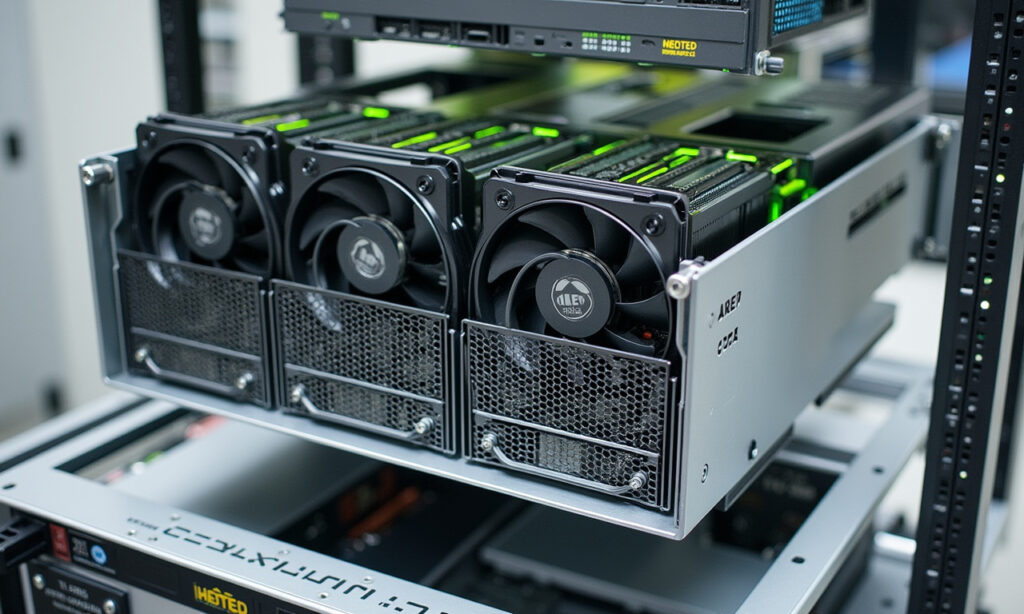The landscape of artificial intelligence (AI) is evolving rapidly, and Vietnam is at the forefront of this transformation. A recent development has seen the introduction of barebone AI servers powered by seven Nvidia GeForce RTX 5090 GPUs, a move that is both innovative and potentially disruptive.
The Rise of AI Servers in Vietnam
In Vietnam, the demand for AI capabilities is skyrocketing, driven by local and international tech firms expanding their infrastructure to meet the growing needs of AI workloads. This surge is fueled by the increasing adoption of cloud computing, big data analytics, and the integration of AI across various industries[1][2][4].
A Vietnamese retailer, Nguyencongpc, has started selling these bespoke AI servers, each equipped with seven RTX 5090 GPUs, cooled by air and powered by a 2000W PSU. This setup is designed to handle large AI workloads, including support for large language models, which are becoming increasingly essential for enterprises.
High Performance at a Lower Cost
The RTX 5090, with its 32GB of GDDR7 memory, offers a compelling blend of high performance and relatively lower costs compared to Nvidia’s dedicated AI accelerators. When multiple RTX 5090 GPUs are used in tandem, they can match or exceed the memory capacity needed for enterprise-level AI applications without the hefty price tag associated with Nvidia’s RTX Pro or H-series products.
Mounting Supply Pressures
However, this innovative solution comes with a significant caveat: mounting supply pressures. The RTX 5090 is already facing stock issues, with prices climbing past $3000 in many markets and some listings nearing $4000. This scenario is eerily reminiscent of the GPU shortages and price spikes caused by cryptomining in the early 2020s.
Historical Parallels
During the cryptomining boom, high-end GPUs were in high demand, leading to record pricing and shortages that lasted for extended periods. Nvidia attempted to mitigate this by introducing mining limiters, but miners found ways to bypass these restrictions, keeping retail prices inflated. History might be repeating itself, but this time driven by AI demand rather than cryptocurrency.
Implications for Gamers and AI Enthusiasts
The redirection of gaming GPUs towards AI markets poses a significant challenge. If Nvidia does not take steps to prevent this, gamers could once again find themselves unable to purchase the latest graphics hardware at fair prices. The modding community is already exploring ways to increase onboard memory further, which could exacerbate the supply issues.
The Broader Impact on Vietnam’s Tech Infrastructure
Vietnam is experiencing a significant surge in data center investments, with both local and international players expanding their infrastructure to meet the growing demand for AI. Local tech companies like Viettel are aggressively increasing their investments, with plans to build large-scale data centers and partner with AI leaders to develop advanced infrastructure featuring supercomputers and GPU cards[1].
Government Support and Infrastructure Challenges
The Vietnamese government is actively promoting digital transformation through initiatives like the National Digital Transformation Program, which includes strategies for expanding IT infrastructure and enhancing cybersecurity. However, challenges such as power supply issues, legal regulations, and a shortage of skilled workers in the AI sector need to be addressed to fully capitalize on Vietnam’s potential as a data center hub[1][2].
Conclusion
The emergence of AI servers powered by RTX 5090 GPUs in Vietnam marks a significant milestone in the country’s digital transformation journey. While this innovation holds great promise for enterprise-level AI applications, it also raises critical questions about the sustainability of GPU supply chains and the impact on other industries that rely on these powerful computing components. As Vietnam continues to grow as a hub for data center operations, addressing these challenges will be crucial for ensuring that the benefits of AI are accessible to all stakeholders.
